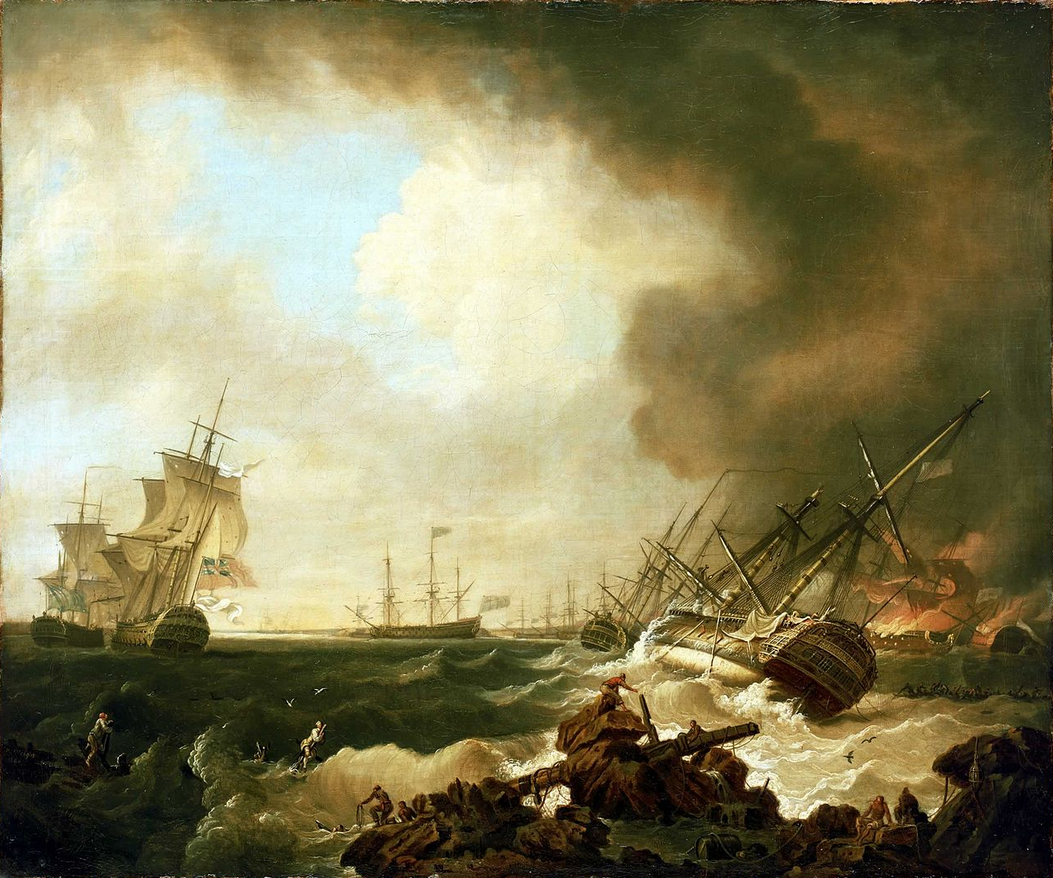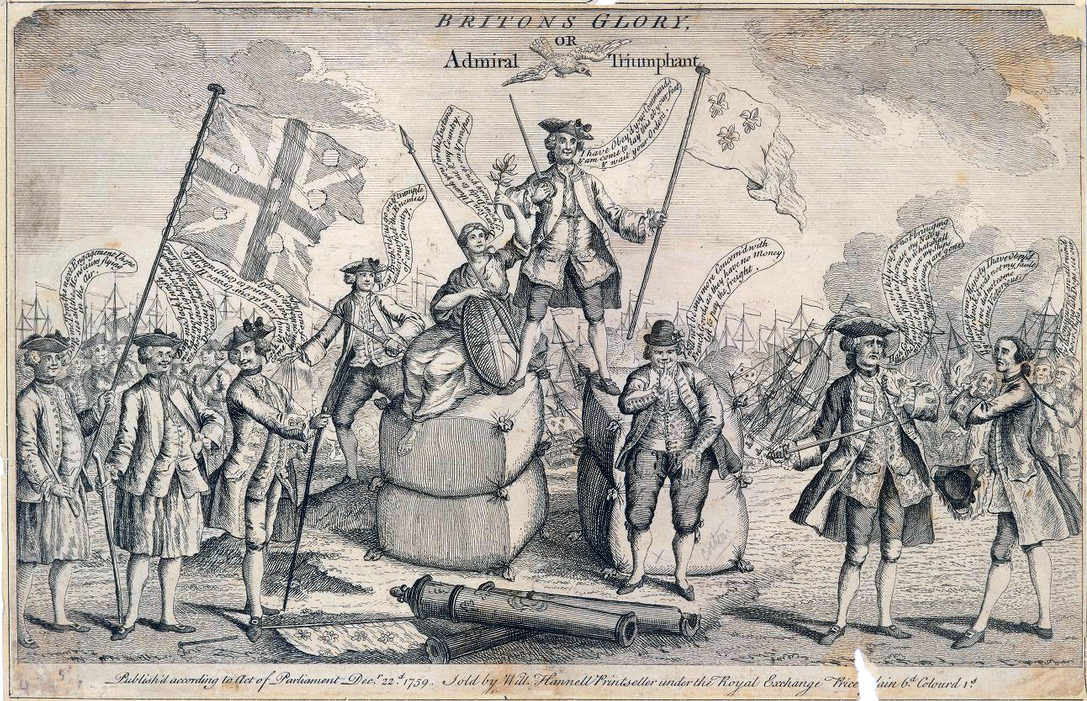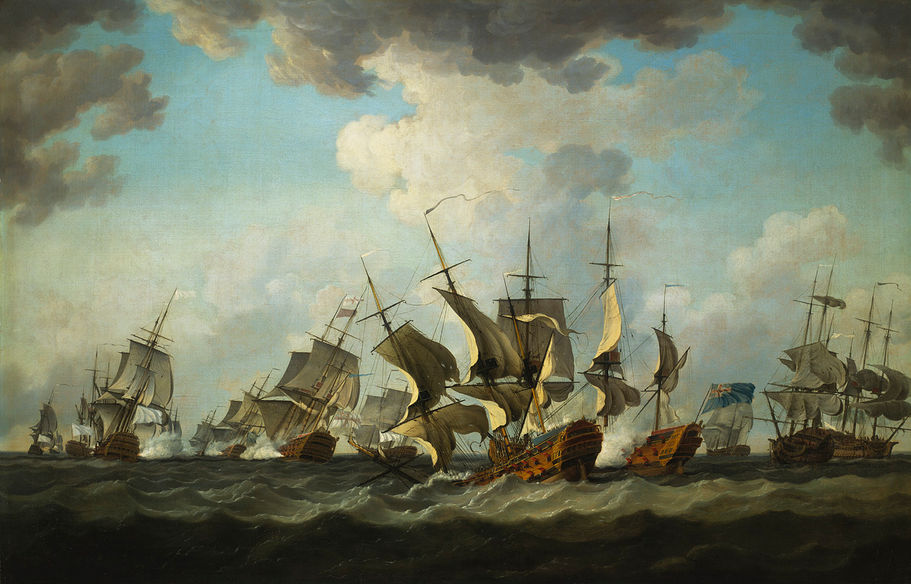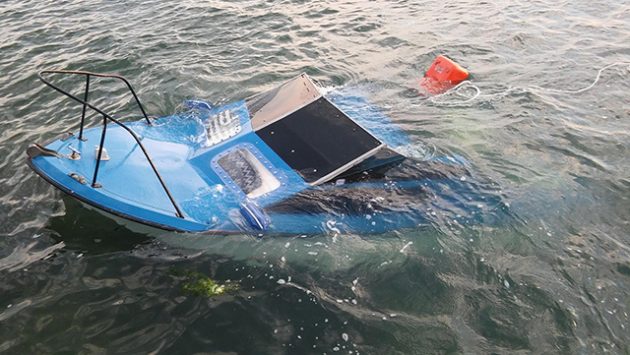Editor’s note: The following is extracted from Types of Naval Officers, Drawn From the History of the British Navy, by A. T. Mahan (published 1902). All spelling in the original.
Hawke’s day had come. Towards ten o’clock he had the enemy sufficiently in view to see that they were intent upon securing their arrival, rather than fighting. He therefore made signal for the seven ships nearest them “to chase and draw into a line-of-battle ahead of me, and endeavour to stop them till the rest of the squadron should come up, who also were to form as they chased that no time might be lost in the pursuit.” The French “kept going off under such sail as all their squadron could carry and yet keep together, while we crowded after him with every sail our ships could bear.” The words italicized sum up the whole philosophy of a general chase. The pursued are limited to the speed of the slowest, otherwise he who cannot but lag is separated and lost; the pursuer need slacken no whit, for his friends are ever coming up to his aid. Overtaking is inevitable, unless the distance is too short.
At half-past two firing began between the French rear and the leading British. Of the two foremost in the chase, who thus opened the fight, one was the same Dorsetshire which in Mathews’s battle had played the laggard. Her captain, who thus rose to his opportunity, was one of the two to whom Hawke addressed the enthusiastic compliment that they had “behaved like angels.” Hawke himself was at this moment south of Belleisle, with several ships ahead of him; while the French admiral was leading his fleet, in order better to pilot them over dangerous ground, and by his own action show more surely than was possible by signal what he wished done from moment to moment. At the southern extreme of the shoals which act as a breakwater to Quiberon Bay are some formidable rocks, known as the Cardinals. Around these M. de Conflans passed soon after the firing began, his rear being then in hot action.
Hawke himself was without a pilot, as were most of his captains. The sailing master of the flag-ship was charged with that duty for the fleet, but had of the ground before him no exact personal knowledge; nor could reliance be placed upon the imperfect surveys of a locality, which it was not the interest of an almost constant enemy to disclose. Enough, however, was known to leave no doubt of the greatness of the risks, and it was the master’s part to represent them. The occasion, however, was not one of a mere diversion, of a secondary operation, but of one vital to the nation’s cause; and Hawke’s reply, stamped with the firmness of a great officer, showed how little professional timidity had to do with his laudable care of his fleet in Basque Roads two years before. “You have done your duty in warning me,” he replied; “now lay us alongside the French Commander-in-chief.” So amid the falling hours of the day the British fleet, under the unswerving impulse of its leader, moved steadfastly forward, to meet a combination of perils that embraced all most justly dreaded by seamen,—darkness, an intricate navigation, a lee shore fringed with outlying and imperfectly known reefs and shoals, towards which they were hurried by a fast-rising wind and sea, that forbade all hope of retracing their steps during the long hours of the night.
“Had we but two hours more daylight,” wrote Hawke in his official report, “the whole had been totally destroyed or taken; for we were almost up with their van when night overtook us.” His success would have been greater, though not more decisive of issues than the event proved it; but nothing could have added to the merit or brilliancy of his action, to which no element of grandeur was wanting. This was one of the most dramatic of sea fights. Forty-odd tall ships, pursuers and pursued, under reefed canvas, in fierce career drove furiously on; now rushing headlong down the forward slope of a great sea, now rising on its crest as it swept beyond them; now seen, now hidden; the helmsmen straining at the wheels, upon which the huge hulls, tossing their prows from side to side, tugged like a maddened horse, as though themselves feeling the wild “rapture of the strife” that animated their masters, rejoicing in their strength and defying the accustomed rein.
The French admiral had flattered himself that the enemy, ignorant of the ground, would not dare to follow him round the Cardinals. He was soon undeceived. Hawke’s comment on the situation was that he was “for the old way of fighting, to make downright work with them.” It was an old way, true; but he had more than once seen it lost to mind, and had himself done most to restore it to its place,—a new way as well as an old. The signals for the general chase and for battle were kept aloft, and no British ship slacked her way. Without ranged order, save that of speed, the leaders mingled with the French rear; the roar and flashes of the guns, the falling spars and drifting clouds of smoke, now adding their part to the wild magnificence of the scene. Though tactically perfect in the sole true sense of tactics, that the means adopted exactly suited the situation, this was a battle of incidents, often untold,—not one of manoeuvres. As the ships, rolling heavily, buried their flanks deeply in the following seas, no captain dared to open his lower tier of ports, where the most powerful artillery was arrayed—none save one, the French Thésée, whose rashness was rebuked by the inpouring waters, which quickly engulfed both ship and crew. The Superbe met a like fate, though not certainly from the same cause. She sank under the broadside of the Royal George, Hawke’s flag-ship. “The Royal George’s people gave a cheer,” wrote an eye witness, “but it was a faint one; the honest sailors were touched at the miserable state of so many hundreds of poor creatures.” Americans and English can couple this story of long ago with Philip’s ejaculation off Santiago de Cuba, but three years since: “Don’t cheer, boys, those poor devils are dying.”

By five o’clock two French ships had struck, and two had been sunk. “Night was now come,” wrote Hawke, “and being on a part of the coast, among islands and shoals of which we were totally ignorant, without a pilot, as was the greatest part of the squadron, and blowing hard on a lee shore, I made the signal to anchor.” The day’s work was over, and doubtless looked to him incomplete, but it was effectually and finally done. The French Navy did not again lift up its head during the three years of war that remained. Balked in their expectation that the foe’s fear of the beach would give them refuge, harried and worried by the chase, harnessed to no fixed plan of action, Conflans’s fleet broke apart and fled. Seven went north, and ran ashore at the mouth of the little river Vilaine which empties into Quiberon Bay. Eight stood south, and succeeded in reaching Rochefort. The fate of four has been told. Conflans’s flag-ship anchored after night among the British, but at daybreak next morning cut her cables, ran ashore, and was burned by the French. One other, wrecked on a shoal in the bay, makes up the tale of twenty-one. Six were wholly lost to their navy; the seven that got into Vilaine only escaped to Brest by twos, two years later, while the Rochefort division was effectually blocked by occupying Basque Roads, the islands of which and of Quiberon were cultivated as kitchen gardens for the refreshment of British crews.
Of the British, one ship went on a shoal during the action, and on the following day another coming to her assistance also grounded. Both were lost, but most of their people were saved. Beyond this Hawke’s fleet suffered little. “As to the loss we have sustained,” wrote he, “let it be placed to the account of the necessity I was under of running all risks to break this strong force of the enemy.”
A contemporary witness assigns to Hawke’s own ship a large individual share in the fighting. Of this he does not himself speak, nor is it of much matter. That all was done with her that could be done, to aid in achieving success, is sufficiently assured by his previous record. Hawke’s transcendent merit in this affair was that of the general officer, not of the private captain. The utmost courage shown by the commander of a single ship before the enemy’s fire cannot equal the heroism which assumes the immense responsibility of a doubtful issue, on which may hang a nation’s fate; nor would the admiral’s glory be shorn of a ray, if neither then nor at any other time had a hostile shot traversed his decks.
The night of the 20th passed in anxieties inseparable from a situation dangerous at best, but still more trying to an admiral upon whom, after such a day, night had closed without enabling him to see in what case most of his ships were. “In the night,” he reports, “we heard many guns of distress fired, but, blowing hard, want of knowledge of the coast, and whether they were fired by a friend or an enemy, prevented all means of relief.” In the morning he resumed his activity. Little, however, could be done. The continuing violence of the wind, and ignorance of the ground, prevented approach within gun-shot to the ships at the mouth of the Vilaine, while they, by lightening and favor of the next flood tide, warped their way inside through the mud flats.
Hawke remained nearly two months longer, returning to England January 17, 1760. He had then been thirty-five weeks on board, without setting foot on shore. At the age of fifty-four, and amid such manifold cares, it is not to be wondered at that he should need relief. Rather must he be considered fortunate that his health, never robust in middle life, held firm till his great triumph was achieved. Boscawen succeeded him temporarily in the command.

He was received in England with acclamations and with honors; yet the most conspicuous mark of approval conferred on admirals before and after, the grant of the peerage, was not given to him, who had wrought one of the very greatest services ever done for the country. Recent precedent—that of Anson—demanded such recognition; and popular enthusiasm would have applauded, although the full military merit of the man could scarcely be appreciated by the standards of his generation. That no such reward was bestowed is most probably attributable to Hawke’s own indifference to self-advancement. If demanded by him, it could scarcely have been refused; but he never pushed his own interests. His masculine independence in professional conduct, towards superiors and inferiors, found its root and its reflection in personal unconcern—as well antecedent as subsequent—about the results from his actions to his fortunes. To do his own part to the utmost, within the lines of the profession he knew, was his conception of duty. As he would not meddle with the land officers’ decision as to what they should or should not do, so he left to the politicians, in whose hands the gifts lay, to decide what they would, or should, accord to a successful admiral. Pitt, the Great Commoner, left Hawke a commoner. Possibly he recognized that only by stretch of imagination could Hawke be reckoned one of the creations of a great Minister’s genius.
Little remains to tell. On September 3, 1762, the admiral’s flag was hauled down for the last time. He never went to sea again. In 1766, when Pitt came back to power as Lord Chatham, Hawke became First Lord of the Admiralty, and so remained till 1771. It was a time of unbroken peace, succeeding a period of continuous wars extending over a quarter of a century; consequently there was in naval and military matters the lassitude usual to such a period. Hawke is credited with formulating the principle that “the British fleet could only be termed considerable in the proportion it bore to that of the House of Bourbon;” that is, to the combined navies of France and Spain, over which that House then reigned. The maxim proves that he had some claim to statesmanship in his view of affairs outside his service; and his manifested freedom from self-seeking is the warrant that no secondary political motives would divert his efforts from this aim. That he succeeded in the main, that he was not responsible for the fallen condition of the fleet when war again arose in 1778, is evidenced by a statement, uncontradicted, in the House of Lords in 1779, that when he left office the navy had 139 ships-of-the-line, of which 81 were ready for sea.
In 1765 Hawke, who was then already a full admiral, wearing his flag at the mainmast head, was made Vice-Admiral of Great Britain; an honorary position, but the highest in point of naval distinction that the nation had to give. As one who held it three-quarters of a century later wrote, “It has ever been regarded as the most distinguished compliment belonging to our profession.” The coincidence is significant that upon Hawke’s death Rodney succeeded him in it; affirming, as it were, the consecutiveness of paramount influence exercised by the two on the development of the Navy. In 1776 the peerage was at last conferred; seventeen years after his great victory, and when, having passed three score and ten, a man who had ever disdained to ask must have felt the honor barren to himself, though acceptable for his son.
His last recorded professional utterances are in private letters addressed in the summer of 1780 to the commander-in-chief of the Channel Fleet—Francis Geary—who had served with him in the Bay of Biscay, though he missed Quiberon. He recommends the maintenance of his old station off Brest, and says, “For God’s sake, if you should be so lucky as to get sight of the enemy, get as close to them as possible. Do not let them shuffle with you by engaging at a distance, but get within musket shot if you can. This will be the means to make the action decisive.” In these words we find an unbroken chain of tradition between Hawke and Nelson. One of Hawke’s pupils was William Locker; and Locker in turn, just before Hawke’s death, had Nelson for a lieutenant. To him Nelson in after years, in the height of his glory, wrote, “To you, my dear friend, I owe much of my success. It was you who taught me,—’Lay a Frenchman close and you will beat him.'”
Hawke died October 16, 1781. On his tomb appear these words, “Wherever he sailed, victory attended him.” It is much to say, but it is not all. Victory does not always follow desert. “It is not in mortals to command success,”—a favorite quotation with the successful admirals St. Vincent and Nelson. Hawke’s great and distinctive glory is this,—that he, more than any one man, was the source and origin of the new life, the new spirit, of his service. There were many brave men before him, as there were after; but it fell to him in a time of great professional prostration not only to lift up and hand on a fallen torch, but in himself to embody an ideal and an inspiration from which others drew, thus rekindling a light which it is scarcely an exaggeration to say had been momentarily extinguished.









